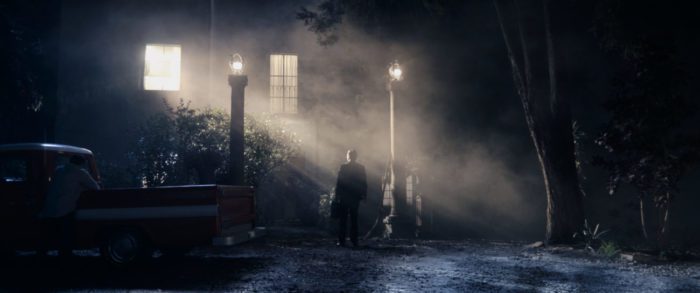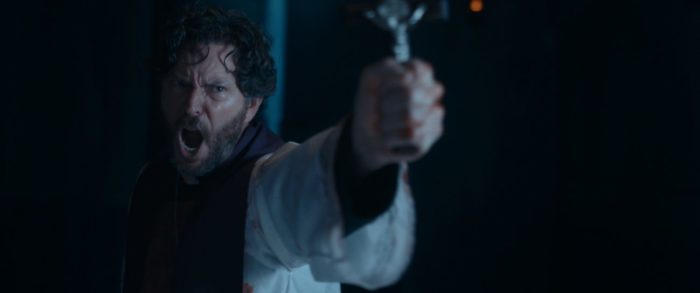You have particular expectations when you’re offered to review a film called The Exorcism of God. The first thing you do—because we all do—is judge the title. I mean, that’s the kind of title you expect to find while rummaging around a bargain bin or front and center in a free movie app, right? Expectations for the film were not high. Whatever the film’s intention was going to be, it really had to back up whatever was coming, and often with indie films, that means cheap CGI, poor acting, or other technical problems. I can honestly say that wasn’t the case with The Exorcism of God. Within the first five minutes, most of my expectations were met. After about fifteen, I was sold on the experience.
We meet Father Peter Williams (It: Chapter Two’s Will Beinbrick), arriving at the house of a possessed young girl (Irán Castillo), standing in the street light like the poster of The Exorcist. Cocking my head to the side in the wake of the unsubtle nod, I had to at least give director Alejandro Hidalgo credit for getting the moment out of the way early. In the moments leading up to the opening exorcism, Peter receives a call from Father Michael Lewis (The Fresh Prince of Bel-Air’s Joseph Marcell), imploring Peter not to go through with the exorcism until he’s free from sin. Whatever sins Father Peter carries with him into the exorcism lead him to invite the demon in. The introduction ends there, but the audience has a good idea about what transpires under the blinking red light of the holy camera aimed directly at the bed.

Immediately audiences will see fantastic makeup and visual effects, great cinematography and lighting, and quality acting from Beinbrick and company. The whirlwind introduction filled with psychosexual elements instilling the idea that even priests are subject to humanity’s weaknesses. Despite the fact that I could hear the sound of my mother in the back of my head, clicking her tongue and rolling her eyes in disgust over the discarding of my Catholic upbringing, I was enjoying the dark, unrepentant tone of the film’s inaugural scene. I grew up with strict parents in a pretty religious household. Not that a movie called The Exorcism of God would have ever even been on the menu, but this film would have either been ejected and junked or thrown in a secret cabinet for my father to watch alone later. Maybe that’s why I was a little drawn to the film in the first place, the blasphemous content notwithstanding. I also believe that most movies are just entertainment and don’t think the devil is coming for my soul no matter how contentious the title is.
Eighteen years after the events of that night, Father Peter has thrown himself into his work and made himself a pillar of the Mexican community he resides in. People even take to calling him a saint. An outbreak affecting children causes much concern, leading him to a hospital and a reunion with the woman he exorcised the demon from all those years ago. He learns of a daughter, Esperanza (María Gabriela de Faría), conceived on that long-ago night, now afflicted with the same demon possession as her mother. Old wounds surface, and Peter begins struggling with his past and faith. Father Peter has sought repentance for his past actions many times, even trying to provide the VHS tape of the event to the bishop all these years later.
In one of the film’s most unforgettable scenes, Peter walks into his church and is attacked by a possessed Jesus. The audience is unsure what to make of these events, but the moment certainly comes with a jaw-drop and a sinfully gleeful “Oh my God!” in the most literal sense. The moment effectively crafts its own exorcism by scaring the absolute hell out of the viewer and serving as an idea of originality the horror community has never adopted. Assuming demons seek out the weak spots in their holy rivals, could a demon have plagued Jesus?

There’s a lot of problematic material throughout The Exorcism of God but possessed Jesus isn’t part of it. For starters, we have a priest that spends eighteen years in a hell of his own making, and we’re expected to be okay with his divine actions in the eighteen years that follow his cover-up of a rape. I suppose he earns some credit because he was fighting a demon at the time, but it’s still cringeworthy. Perhaps even a bit of a leap for an audience aware of how the archdiocese works in the aftermath of scandals, but you’re hooked by the film’s extremely tense atmosphere and disturbing imagery.
Father Michael Lewis joins Peter in Mexico on his quest to save his daughter and, if things weren’t already weird enough, they start getting stranger. A demon with a doll’s head and different colored eyes begin stalking nurses at the hospital, and a legion of possessed rises through the inmates of a psychiatric prison ward.
The Exorcism of God is a lot of fun for the most part. A vicious and brutal exorcism film that doesn’t hold back or protect the men who wear the cloth. In some ways, the film often acts satirically against religion in this vein, as if presenting a possessed Jesus Christ like an Evil Dead deadite wasn’t enough evidence of that already. Exorcism alone has left its mark on religion. Here, it’s attacking traditional notions about the priesthood and institutional tactics that have hurt religious people for putting their trust in a system that doesn’t respect its own values.

At the very end of The Exorcism of God, there’s a moment that I had to stop and question. At first, it rolled off me, knowing that the film is searing organized religion through the angle of the fallen priest whose misdeeds are swept under the rug institutionally. The line is homophobic, but traditionally speaking, so is the Catholic Church. Given the already blasphemous nature of the film, it’s easy to construe the singular moment as social recognition of the church’s repugnant principles, and, given the end of the film, we know that the person saying the words is an apple that has fallen far from the divine tree. Platforming and posturing, the line is met with praise by churchgoers before the concluding moments reveal more devilish tactics. While I can add this moment to the institutional satire and blind following that practices this, what disturbed me more was the final line of the film that doubled down on the sentiment, leaving a bit of bad taste in my mouth.
I tried to research the director, who had also directed the well-admired time-travel horror flick The House at the End of Time, but came across nothing critically that denounced the moment in The Exorcism of God. The line could just as easily have been left out of the film, and no one would notice it was missing. However, morally speaking, since the film is about the ugliness of institutional practices, and though what’s said is harmful, maybe it is supposed to be there and I just didn’t understand it.
I remain slightly unsure about The Exorcism of God. While I had a lot of fun watching Alejandro Hidalgo’s film and all its chaos, the ending soured that. I’ve struggled to write this review since. With many LGBTQ+ friends to think about, and specifically how this type of dialogue and thinking is hurting the world, especially with new laws in Texas and proposed laws in Florida making headlines, it gave me food for thought. Both of those notably Republican states wield religion unjustly, and in Mexico, where the film takes place, some areas have laws similar to the new ones enacted in Texas. The film seems to be mirroring something I wrote about following the capital riot on January 6, 2021, that faithfully following a cause that doesn’t hold up its own beliefs isn’t exactly righteous.
The Exorcism of God comes to VOD on March 11.




You had me until you turned a horror movie review into a political nonsense debate. Seriously? Is it that hard to just review a movie. At least I now know whose reviews to avoid. Get a clue. Some of us are over it. It’s a freakin horror movie. Ridiculous